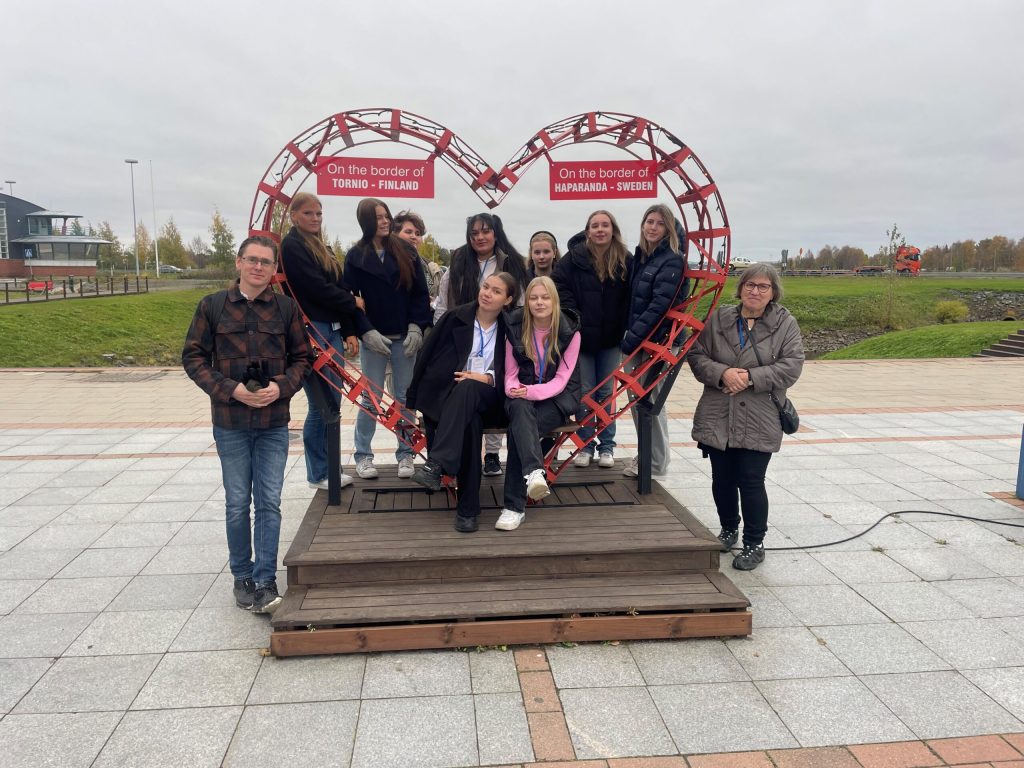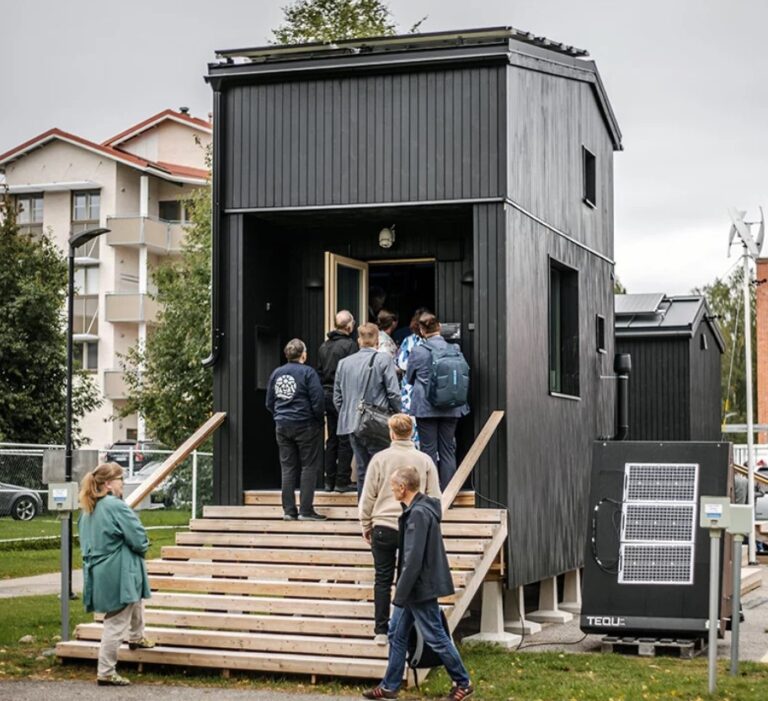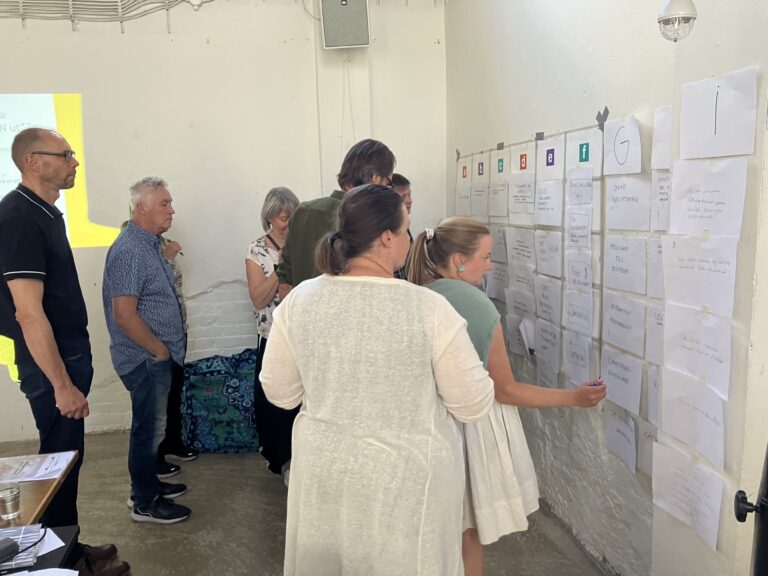In the border city of Tornio, high school students and teachers from northern Sweden and Finland gathered on 8-9 October 2024 for two days of international exchange focusing on cross-border cooperation and exploring opportunities for working, studying, and living across the national border under the theme Borderless North.
“The goal of the exchange is to encourage cross-border cooperation to strengthen our common region. We already have a strong network between schools that cooperate across the border, and this is an opportunity for them to meet in person, exchange experiences, and learn together. Meeting in Tornio and Haparanda adds extra significance as these border cities are practical examples of how borderless cooperation can work. A border doesn’t have to present challenges, it can rather open up opportunities,” says Raija Paasimaa, project coordinator at Vocational Institute Lappia.
The Borderless North event was organized within the framework of the Interreg Aurora funded project Aurora Entrepreneurialis, which aims to develop an entrepreneurial culture in schools, sustainable entrepreneurship, and cross-border cooperation between upper secondary schools in the region.
The event began with two lectures that provided insights into what the border has meant in the region’s history. Joni-Pekka Karjalainen from the Tornio Valley Museum spoke about the region’s shared history and how the 1809 border splitting up Finland and Sweden affected the people here in the border area. Sari Moisanen from the Sea Lapland Development Center spoke on the theme “The green growth starts from the north” and highlighted ongoing and upcoming investments in the region.
“As a history freak, it was incredibly interesting to learn more about how the border has evolved over time. I feel hopeful about the future as there are investments in the region. Personally, I want to work in the arts. Even though many investments are focused on industry, I think it will also positively affect opportunities in art and culture,” says student Nette Nikula from Lappia (Tornio).
With a combination of lectures, workshops, and company visits, the students and teachers delved into cross-border collaborations, with entrepreneurship and sustainability as the central themes. The participants visited companies such as KaMa-palvelut, Pipelife Finland, Tornion Panimo, Studieförbundet Vuxenskolan in Haparanda, Rajalla shopping center, Business Tornio, and IKEA.
“For me, it has truly been an eye-opener. The company visits were particularly inspiring, seeing more of what happens behind the scenes. I feel motivated to arrange more study visits at my school,” says teacher Ville Ahmala, Oulun normaalikoulu.
“It is incredibly educational for our students, who, besides learning interesting subjects, also get to practice social and language skills, which is a big part of working with entrepreneurship,” says teacher Merja Marjakangas, Oulun normaalikoulu.
“Personally, I really appreciate doing this type of activity with our students and teachers. It adds a special touch to everyday life to learn and experience together, and you return to your daily routine filled with new energy,” says Anette Lund, principal at Björknäsgymnasiet in Boden. “I would also encourage other school leaders to participate in this type of cooperation as it facilitates its integration back home,” Anette concludes.
The students worked in groups with both Swedish and Finnish participants, during and after the company visits, to develop visions for cross-border cooperation in the future.
“I really liked the company visits. It was great to get to see what we’ve studied in practice. As a relatively new resident in Oulu, it was fun to meet lots of new friends. Already on the bus ride here, I got to know other students from Oulu. And for me, who enjoys brainstorming ideas, all the different exercises were super interesting,” says 16-year-old Minja Tervo from Oulun Suomalaisen Yhteiskoulun Lukio.
Some of Minja’s new friends are Kristiine and Hilla from Tornio.
“It’s been so fun to meet lots of nice and cool people. Everyone has been super kind, and it’s gone well to collaborate with students from other schools in Sweden and Finland. Even though one of the big challenges with the border is language, it has gone surprisingly well to get to know each other,” says Kristiine Abong and Hilla Jauhiainen from Tornion Yhteislyseon Lukio.
Oliver Lindquist, Anton Berglund, and Milton Brostöm, first-year students from the Technology program at Björknäsgymnasiet in Boden, agree that language can be a challenge, but they still managed to make new friends from other schools.
“It was a bit uncertain with English at first, but you quickly get into it,” says Oliver.
“You realize the benefit of working across the border as it allows for a larger market and more customers,” says Anton. “But language differences are still a challenge. It feels important to have good camaraderie with your neighboring country.”
Project leader Linda Strandenhed from Young Entrepreneurship Norrbotten summarizes: “It feels particularly exciting to raise issues of cross-border cooperation here in Tornio and Haparanda, where it is such an important part of the place’s character and heritage. We want to contribute to creating long-term cooperation around entrepreneurship education and sustainable entrepreneurship between schools, and this exchange is part of that work.”
The Aurora Entrepreneurialis project is run by the City of Oulu, Ung Företagsamhet Norrbotten, and the Vocational Institute Lappia and is funded by Interreg Aurora, Region Norrbotten, and Lapin Liitto. The project runs for three years and aims to develop entrepreneurship education at the secondary school level in Norrbotten and northern Finland.
Read more about the project https://www.ouka.fi/en/aurora-entrepreneurialis





